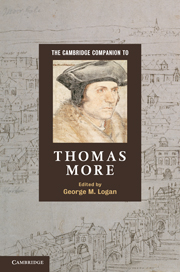12 - Afterlives
from Part III - Reception
Published online by Cambridge University Press: 28 May 2011
Summary
‘Utopia’ is a ‘medieval fantasy game … where the lowliest of peasants
can become the world’s greatest heroes … Every decision, every
challenge will be yours and yours alone.
From a Google search of ‘Utopia’Sometimes a neologism’s afterlife is even busier than that of its inventor. A recent Google search of ‘Thomas More’ brought 2,500,000 hits, but a search of ‘utopia’ yielded exactly 18,000,000. All those zeros! How fitting for More’s Nowhere, even though its name is now nearly everywhere, even reimagined – witness my epigraph – as a computer game combining feudalism with American get-up-and-go.
What of the man who coined ‘utopia’? More’s early biographer William Roper reports that after his arraignment More told his judges (as he told others) that he and they would ‘in heaven merrily all meet together’ (Roper 250). This essay, however, will focus on More’s earthly afterlife and that of his two major works The History of King Richard the Third and Utopia. In his own day his Latin epigrams were widely enjoyed, his savage polemics roundly condemned but just as savagely answered by William Tyndale and other Reformers, and his eloquent Tower Works (particularly the Dialogue of Comfort against Tribulation) published and, if we may judge from a few allusions, read with appreciation. But More’s later fame was shaped largely by ambivalent memories of the man, by the usurping duke of York whom he helped make an archetype of pathologically cunning tyranny, and by the famous island that gave us the word ‘utopia’, the genre of utopian fantasy, and eventually, in an expansion of More’s pun on u/eutopia, the word ‘dystopia’. It is on these three afterlives – of the person and his two most influential books – that I will focus.
- Type
- Chapter
- Information
- The Cambridge Companion to Thomas More , pp. 265 - 287Publisher: Cambridge University PressPrint publication year: 2011
- 2
- Cited by

